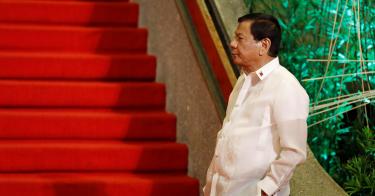The Philippines isn’t in the news much here in the United States — unless, of course, President Trump makes a weekend phone call to its president, Rodrigo Duterte, that included a nonspecific invite to Washington, D.C.
Now Manila is in the headlines.
It’s not to say that Duterte’s conduct of a “war on drugs” in the Philippines isn’t something to be concerned about from a legal or human rights perspective — due to reported allegations of a large number of extra-judicial killings.
Some are bothered that Trump’s call to Duterte — which was branded “very friendly” — gives the appearance of a White House seal of approval to the reported brass knuckle tactics of the democratically elected Philippine president.
That sort of direct linkage is a serious stretch for a number of reasons, but since it’s out there, I think it’s also important to note that U.S.-Philippine relations are much more than Duterte’s reported doings on drugs.
U.S.-Philippines ties are long, dating back more than a century. Our shared history has both happy and unhappy times — from the colonial period, to Philippine independence, to the country’s democratic transition, to post-Cold War.
Today, there’s lots for the two presidents to talk about.
For instance, Washington and Manila are defense treaty allies, going back to 1951. Indeed, U.S. troops will train with Philippine forces next month in the “Balikatan” (native Tagalog for “shoulder to shoulder”) exercise.
China is also an issue. Beijing-Manila relations, which had been confrontational due to territorial disputes, warmed dramatically after Duterte’s election last summer, while ties with Washington, which had been increasingly friendly, cooled precipitously.
Manila’s overtures to Beijing have caused Washington to rethink the Philippines’ role in addressing China’s military buildup (highlighted by the recent launching of its second aircraft carrier) as well as its specious sovereignty claims over one million square miles of the South China Sea.
Plus, there isterrorism. Most people don’t realize that Manila has long been battling an Islamist terrorist organization, the Abu Sayyaf Group, ASG; once allied with al-Qaeda, the ASG now affiliates with the Islamic State.
Beyond the ASG, al-Qaeda had a strong presence in Southeast Asia after 9/11 through its ally, Jemaah Islamiya. In particular, the terror group hit the world’s most populous Muslim nation, Indonesia, hard. Some plots (e.g., in Singapore) were foiled.
The Islamic State and al-Qaeda are always looking for new places to set up shop.
While Manila doesn’t have the military might for a fight with Pyongyang, Washington could be looking for help in containing and punishing North Korea at the United Nations or in some other way.
Lastly, Trump is reportedly going to Southeast Asia this fall to the ASEAN (Association of Southeast Asian Nations) and APEC (Asia-Pacific Economic Cooperation) summits in the Philippines and Vietnam.
In possible preparation, the president also called the prime ministers of Singapore (an important partner country) and Thailand (another controversial treaty ally due to a 2014 military coup).
When Trump and Duterte do meet, the president should bring up American human rights concerns, but that would be only one of the issues on a long list — from terror to trade — for them to hash over.
An ice-breaking call now to get started isn’t a bad idea at all.
This piece originally appeared in the Boston Herald



